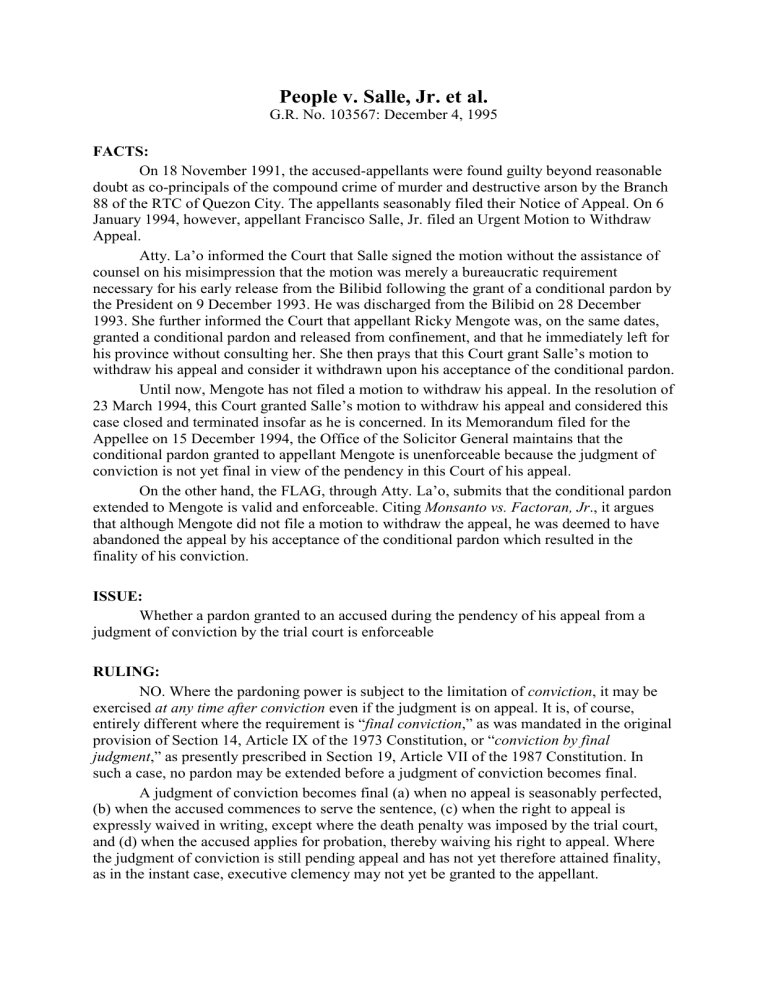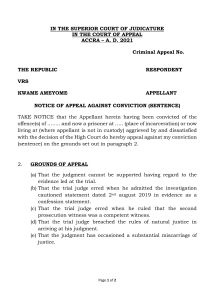12 Digest People v. Salle, Jr. et al., G.R. No. 103567, December 4, 1995
advertisement

People v. Salle, Jr. et al. G.R. No. 103567: December 4, 1995 FACTS: On 18 November 1991, the accused-appellants were found guilty beyond reasonable doubt as co-principals of the compound crime of murder and destructive arson by the Branch 88 of the RTC of Quezon City. The appellants seasonably filed their Notice of Appeal. On 6 January 1994, however, appellant Francisco Salle, Jr. filed an Urgent Motion to Withdraw Appeal. Atty. La’o informed the Court that Salle signed the motion without the assistance of counsel on his misimpression that the motion was merely a bureaucratic requirement necessary for his early release from the Bilibid following the grant of a conditional pardon by the President on 9 December 1993. He was discharged from the Bilibid on 28 December 1993. She further informed the Court that appellant Ricky Mengote was, on the same dates, granted a conditional pardon and released from confinement, and that he immediately left for his province without consulting her. She then prays that this Court grant Salle’s motion to withdraw his appeal and consider it withdrawn upon his acceptance of the conditional pardon. Until now, Mengote has not filed a motion to withdraw his appeal. In the resolution of 23 March 1994, this Court granted Salle’s motion to withdraw his appeal and considered this case closed and terminated insofar as he is concerned. In its Memorandum filed for the Appellee on 15 December 1994, the Office of the Solicitor General maintains that the conditional pardon granted to appellant Mengote is unenforceable because the judgment of conviction is not yet final in view of the pendency in this Court of his appeal. On the other hand, the FLAG, through Atty. La’o, submits that the conditional pardon extended to Mengote is valid and enforceable. Citing Monsanto vs. Factoran, Jr., it argues that although Mengote did not file a motion to withdraw the appeal, he was deemed to have abandoned the appeal by his acceptance of the conditional pardon which resulted in the finality of his conviction. ISSUE: Whether a pardon granted to an accused during the pendency of his appeal from a judgment of conviction by the trial court is enforceable RULING: NO. Where the pardoning power is subject to the limitation of conviction, it may be exercised at any time after conviction even if the judgment is on appeal. It is, of course, entirely different where the requirement is “final conviction,” as was mandated in the original provision of Section 14, Article IX of the 1973 Constitution, or “conviction by final judgment,” as presently prescribed in Section 19, Article VII of the 1987 Constitution. In such a case, no pardon may be extended before a judgment of conviction becomes final. A judgment of conviction becomes final (a) when no appeal is seasonably perfected, (b) when the accused commences to serve the sentence, (c) when the right to appeal is expressly waived in writing, except where the death penalty was imposed by the trial court, and (d) when the accused applies for probation, thereby waiving his right to appeal. Where the judgment of conviction is still pending appeal and has not yet therefore attained finality, as in the instant case, executive clemency may not yet be granted to the appellant.
